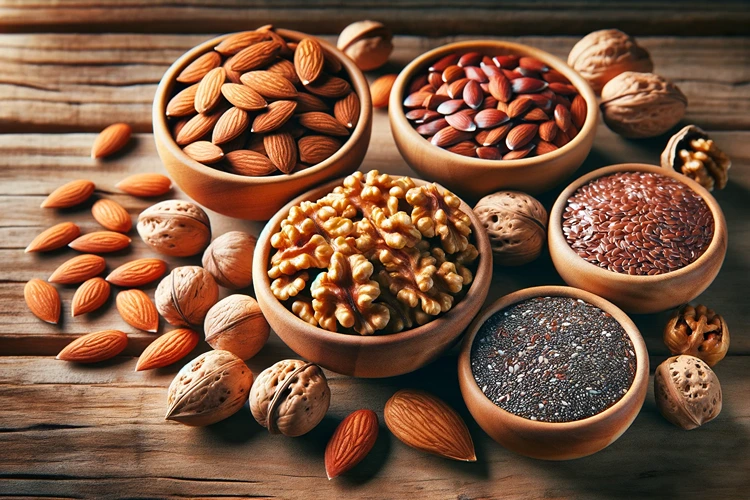Struggling to keep your focus during exam preparation? Wondering how to enhance your memory for those tough college exams? Exploring top brain foods for college exams is crucial for students aiming to enhance their focus and memory. The link between diet and cognitive function is undeniable, with specific nutrients significantly boosting brain power. This guide delves into how students can optimize their dietary habits for improved academic performance, covering everything from Omega-3 rich foods to hydration essentials.
Why Nutrition Matters for Your Brain
Before we explore the specific foods that can aid your brain during exams, let’s understand why nutrition plays a crucial role in cognitive function. Your brain is a powerhouse that consumes about 20% of your body’s energy. Feeding it the right nutrients can enhance your focus, memory, and even mood.
Omega-3 Rich Foods: Your Brain’s Best Friend
Why are Omega-3 fatty acids considered essential for our brains? These powerhouse nutrients are vital for maintaining brain health, enhancing cognitive functions, and even protecting against aging-related decline. Let’s dive deeper into the world of Omega-3s and discover how they can be your brain’s best ally during those crucial college exams.
What Makes Omega-3s So Special?
Omega-3 fatty acids are not just any fat; they are foundational components of cell membranes throughout the body and affect the function of the cell receptors in these membranes. They provide the starting point for making hormones that regulate blood clotting, contraction and relaxation of artery walls, and inflammation. For the brain, specifically, Omega-3s are critical in enhancing brain structure and function.
- DHA (Docosahexaenoic acid): Vital for the structure of the brain, DHA represents about 20% of the brain’s total fat content, playing a crucial role in cognitive development and performance.
- EPA (Eicosapentaenoic acid): Though more known for its anti-inflammatory effects, EPA also has significant implications for mood regulation and cognitive health.
How Can You Incorporate More Omega-3s Into Your Diet?
Incorporating Omega-3 rich foods into your diet is easier than you might think. Here are some top choices:
- Fatty fish like salmon, trout, and sardines are among the best sources.
- Flaxseeds and chia seeds offer plant-based Omega-3 options.
- Walnuts are a snackable way to get your Omega-3s on the go.
Remember, variety is key. Mixing up your sources of Omega-3s can ensure you get the full range of benefits these fatty acids offer.
Why Should Students Pay Attention to Omega-3 Intake?
For students, the benefits of Omega-3s go beyond just enhanced memory and focus. These essential fats play a significant role in:
- Reducing inflammation, potentially lowering the risk of neurodegenerative diseases.
- Improving sleep quality, leading to better concentration and memory recall.
- Supporting mental health, reducing the incidence of depression and anxiety.
With exams and the pressures of college life, ensuring your diet includes foods rich in Omega-3 fatty acids can be a game-changer for both your academic performance and overall well-being.
Helpful Hint:
Planning your meals ahead can help incorporate Omega-3 rich foods into your diet. Consider adding fish to your weekly meal plan or snacking on walnuts when you need a brain boost.
By understanding the importance of Omega-3 fatty acids and making conscious choices to include them in your diet, you’re setting the stage for improved cognitive function, better mental health, and a stronger, more resilient brain. So, why not give your brain the nutrients it needs to thrive?
Antioxidant-Rich Berries: A Colorful Way to Boost Brain Power

- Blueberries
- Strawberries
- Blackberries
Berries are not only delicious but also packed with antioxidants. These compounds can delay brain aging and improve memory. Anthocyanins, the pigments that give berries their vibrant color, have been linked to increased neuronal signaling in brain centers associated with memory.
Whole Grains for Sustained Energy
- Oats
- Barley
- Whole wheat products
Whole grains are a fantastic source of vitamin E, which can help protect your brain from oxidative stress caused by free radicals. They also provide a steady supply of glucose, fueling your brain throughout the day and keeping your focus sharp.
Nuts and Seeds: Essential Brain Fuel
Nuts and seeds stand out as more than just convenient snacks; they are indispensable allies for your brain’s health and functionality. Packed with a potent mix of antioxidants, Omega-3 fatty acids, and proteins, these small but mighty foods pack a punch in enhancing cognitive functions and protecting the brain from various forms of decline. Almonds, for instance, are celebrated for their role in boosting cognitive function and offering a shield against cognitive decline.
But the benefits don’t stop with almonds. Walnuts are another superhero in the nut family, known for their high levels of DHA, a type of Omega-3 fatty acid that has been linked to improved cognitive performance. Similarly, seeds like flaxseeds and chia seeds are not only vegetarian-friendly Omega-3 sources but also loaded with fibers and proteins that support brain health.
Pros
- Enhances memory and focus
- Prevents age-related cognitive decline
- Improves mood and reduces stress
- Supports overall brain health with essential nutrients
Cons
- May be allergenic to some individuals
- High in calories, requiring portion control
- Can be expensive, depending on the variety and region
Incorporating a variety of nuts and seeds into your diet can offer a wide range of benefits for your brain, from improving neuroplasticity—the brain’s ability to form new connections—to enhancing memory and focus. Their high antioxidant content also plays a critical role in combating oxidative stress, a factor that contributes to brain aging and cognitive decline.
Despite their numerous benefits, it’s important to consume nuts and seeds in moderation due to their high calorie and fat content. However, when eaten as part of a balanced diet, they can contribute significantly to brain health and cognitive function, making them an essential component of any diet focused on improving academic performance and overall mental well-being.
Green, Leafy Vegetables
Green, leafy vegetables like spinach, kale, and collards are rich in brain-healthy nutrients such as vitamin K, lutein, folate, and beta carotene. Research suggests these nutrients may help slow cognitive decline.
Stats:
Studies show that individuals who consume green, leafy vegetables once or twice a day experience slower mental deterioration than those who eat no vegetables.
Hydration and Brain Function: The Role of Water

Ever wondered how something as simple as drinking water can impact your brain’s performance? It turns out, hydration is a key player in how effectively our brains operate, especially during high-pressure periods like exams. Let’s dive into why water is crucial for your cognitive functions and how it supports your academic achievements.
How Does Water Affect Your Brain?
Water makes up about 75% of the brain, serving not just as a building block but also as a vital nutrient in all brain activities. It aids in:
- Transporting nutrients to the brain cells
- Removing toxins and waste products
- Maintaining cell structure and health
Adequate hydration is essential for your brain to work at its best. Even mild dehydration can lead to noticeable declines in cognitive functions, such as memory, attention, and decision-making skills.
What Are the Signs of Dehydration?
Recognizing the early signs of dehydration can help you take action before your brain function starts to dip. These signs include:
- Thirst, which is often the first indicator
- Feeling tired or sluggish
- Headaches or dizziness
- Reduced concentration and short-term memory
Staying ahead of these symptoms by keeping hydrated is key to maintaining optimal brain performance, especially during study sessions and exams.
How Much Water Should You Drink?
The amount of water needed can vary based on factors like age, weight, activity level, and climate. However, a general guideline is:
- Men should aim for about 3.7 liters (125 ounces) per day
- Women should aim for about 2.7 liters (91 ounces) per day
This includes all fluids and water-rich foods. Remember, needs increase with exercise and high temperatures.
Helpful Hint:
Carrying a water bottle can remind you to take regular sips throughout the day, ensuring you stay well-hydrated and ready to tackle any academic challenge.
Integrating proper hydration into your study routine is not just about preventing negative effects but actively enhancing your cognitive abilities. By understanding the vital role water plays in brain function, you can make more informed decisions about your daily water intake, setting yourself up for success in your academic endeavors.
Remember, your brain’s performance is heavily influenced by your hydration status. Making a conscious effort to drink enough water throughout the day is a simple, yet effective strategy to boost your focus, memory, and overall cognitive performance, especially during the demanding exam periods.
Eggs: A Nutrient Powerhouse for the Brain
- Rich in choline, crucial for brain development and function
- Contains B vitamins and selenium, supporting cognitive health and mood regulation
Eggs are a versatile and affordable source of high-quality protein and nutrients beneficial for brain health, such as choline, which is vital for the brain’s messaging functions and can help improve memory.
Dark Chocolate: A Delicious Brain Booster
Dark chocolate and cocoa powder are packed with flavonoids, caffeine, and antioxidants. These components may enhance memory and slow down age-related mental decline. Plus, chocolate is a mood booster, which can be especially welcome during the stress of exams.
Pros
- Improves focus, memory, and processing speed
- High in antioxidants
- Boosts mood and combats stress
Cons
- High in calories and sugar (choose dark chocolate with a high cocoa content)
- May cause headaches in some individuals
Avocados: A Fatty Fruit for Brain Health
Avocados are rich in unsaturated fats, contributing to healthy blood flow. This, in turn, promotes healthy brain function. They also contain vitamins C and E, which are known antioxidants that can help protect the brain.
Incorporating Brain Foods into Your Diet
Incorporating these brain-boosting foods into your diet doesn’t have to be complicated. Here are some practical tips:
- Start your day with a breakfast that includes eggs or whole grains.
- Snack on nuts, seeds, or dark chocolate.
- Include a serving of fatty fish or leafy green vegetables in your meals.
- Stay hydrated throughout the day.
By making these foods a regular part of your diet, you can enhance your cognitive functions, including memory, focus, and problem-solving abilities, crucial for academic success.
Foods to Avoid During Exam Prep
Just as some foods can enhance your brain function, others can detract from your cognitive capabilities, especially during exam preparation. Here’s a quick list of foods to minimize or avoid to maintain peak mental performance:
- High Sugar Snacks: While tempting, they lead to energy crashes that can disrupt focus and memory.
- Processed Foods: Often high in trans fats and additives, they can cloud mental clarity and mood.
- Excessive Caffeine: In large amounts, caffeine can cause jitteriness and anxiety, undermining study sessions.
Opting for whole, nutrient-dense foods instead supports sustained energy levels and enhances brain function, making your study time more effective.
FAQs
As we wrap up, remember that diet is just one piece of the puzzle when it comes to optimizing your brain function for exams. Regular sleep, exercise, and stress management are also crucial. By incorporating these top brain foods into your diet, you’re taking a significant step towards not just better grades, but a healthier, sharper mind for years to come.
